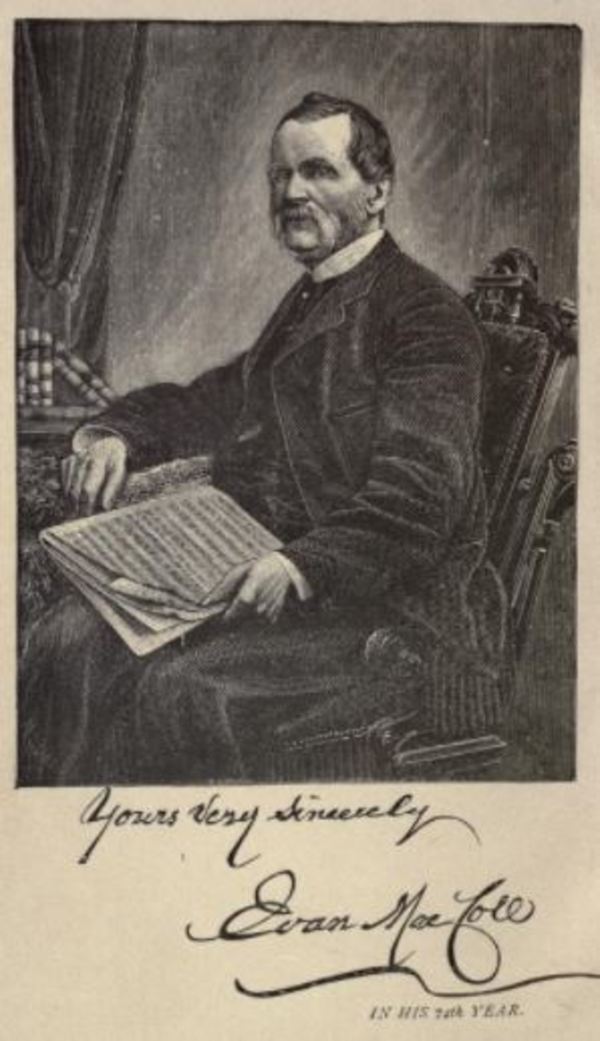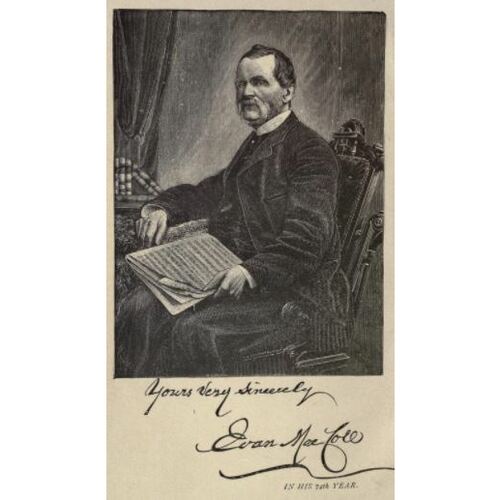
Source: Link
MacCOLL, EVAN, customs officer and poet; b. 21 Sept. 1808 in Kenmore (Strathclyde), Scotland, son of Dugald MacColl and Mary Cameron; m. first Frances Lewthwaite in Liverpool; m. secondly – MacArthur in Kingston, and they had nine children; d. 24 July 1898 in Toronto and was buried in Kingston.
Evan MacColl’s father was a Highland tenant farmer who was famous for his knowledge of Celtic songs. For this reason he knew men of higher social standing and was able, through them, to procure books for his children. The inadequacy of the local school led him to hire a tutor for his precocious son; the tutor helped Evan to read and understand English and awakened his interest in English literature. Despite his poetic and scholarly interests, young Evan knew the labour of spade, plough, sickle, and herring fishing. His father, besides cultivating his small holding, held a contract to repair roads for the dukes of Argyll, and Evan often assisted him in this winter work.
In 1831 the MacColls immigrated to British North America, but Evan remained behind. Five years later he published at his own expense The mountain minstrel, poems and songs in English and Gaelic which, in the author’s own words, were a “rustic wreath of mountain flowers,” “the English productions of a Highland peasant.” In 1838, when the book reappeared in a separate Gaelic edition, MacColl, in the words of a subsequent biographical sketch, was hailed as “a rare acquisition to Gaelic literature, and his right to stand in the front rank of modern Celtic bards was at once established and acknowledged.”
The following year MacColl was appointed a customs clerk in Liverpool through the influence of an Argyll member of parliament. In 1850, after a period of ill health, he obtained a six-month leave of absence to visit his family in Canada. There, a friend of his father’s family, the Reform mla Malcolm Cameron*, invited MacColl to transfer his clerkship to Kingston. According to the biographical sketch, MacColl owed his position to the Reform party and could expect promotion only through political influence. However, because he was suspected of having written partisan lyrics published anonymously in the Reform press, and because “he made it a point of honour never to solicit any favour” from Sir John A. Macdonald, leader of the Conservatives, he received no preferment. When Alexander Mackenzie became prime minister in 1873, MacColl hoped for advancement, but he had received none by the time Macdonald was returned to power five years later. MacColl resigned from the customs service in 1880.
MacColl had long been the leading light of Kingston’s St Andrew’s Society and became known as the Gaelic bard of Canada. Two years after retiring he was honoured by being elected a charter member of the Royal Society of Canada on the recommendation of its founder, the Marquess of Lorne [Campbell*], later the Duke of Argyll. In 1883 MacColl published The English poetical works of Evan MacColl, a number of which had been written in Canada. His eldest son became a minister in the Congregational Church; a daughter became a school-teacher; and another daughter, Mary Jemima, continued the family tradition of writing poetry. At some point after his retirement MacColl settled in Toronto.
MacColl’s poetry was strongly influenced by that of Robert Burns, whom he frequently celebrates. He writes of Scottish landscape, of love, and of political events. His transfer of allegiance was thus only partial. Though he did write about Canada, his deepest attachment remained to Scotland. A minor, albeit historically interesting, figure, he represents the immigrant experience in 19th-century Canadian poetry.
Evan MacColl is the author of The mountain minstrel; or Clàrsach nam Beann: consisting of original poems and songs in English and Gaelic (Glasgow, 1836), Clàrsach nam Beann, no Dàin agus òrain . . . (Edinburgh and Glasgow, 1838), and The English poetical works of Evan MacColl . . . with a biographical sketch of the author by A. MacKenzie . . . (Toronto, 1883), all of which went through several editions. The sketch, based on Mackenzie’s meeting with MacColl in Kingston (described in Alexander Mackenzie, “The editor in Canada, v,” Celtic Magazine (Inverness, Scot.), 5 (1879–80): 189–91), first appeared in Mackenzie’s “Evan Maccoll – the ‘Bard of Lochfyne,’” Celtic Magazine, 6 (1880–81): 54–58, 95–103. The magazine’s series on MacColl concluded by publishing part of the bard’s diary as “Extracts from notes of a tour in the north of Scotland in 1838–39,” 6: 139–45. Four of MacColl’s English poems are included, along with a brief biographical note, in Selections from Canadian poets . . . , ed. E. H. Dewart (Montreal, 1864; repr., intro. Douglas Lochhead, Toronto and Buffalo, N.Y., 1973). A biography of him in Gaelic by Alexander Fraser*, entitled “Am Bard Mac Colla,” appears in Fraser’s Leabhar nan Sonn; gearr-aithris air curaidhean na craoibhe ruaidhe is air diulanaich iomraiteach la an diugh, le Alasdair Friseal (Toronto, 1897), 35–65.
John Mackenzie, Sar-obair nam bard gaelach: or, the beauties of Gaelic poetry, and lives of the highland bards . . . , intro. James Logan (Glasgow, 1841). Daily Mail and Empire, 25 July 1898. Globe, 25 July 1898. Canadian men and women of the time (Morgan; 1898). Cyclopædia of Canadian biog. (Rose and Charlesworth), vol.2. Morgan, Bibliotheca canadensis. RSC, Fifty years retrospect, anniversary volume, 1882–1932 ([Ottawa, 1932?]).
Cite This Article
John Ferns, “MacCOLL, EVAN,” in Dictionary of Canadian Biography, vol. 12, University of Toronto/Université Laval, 2003–, accessed December 31, 2025, https://www.biographi.ca/en/bio/maccoll_evan_12E.html.
The citation above shows the format for footnotes and endnotes according to the Chicago manual of style (16th edition). Information to be used in other citation formats:
| Permalink: | https://www.biographi.ca/en/bio/maccoll_evan_12E.html |
| Author of Article: | John Ferns |
| Title of Article: | MacCOLL, EVAN |
| Publication Name: | Dictionary of Canadian Biography, vol. 12 |
| Publisher: | University of Toronto/Université Laval |
| Year of publication: | 1990 |
| Year of revision: | 1990 |
| Access Date: | December 31, 2025 |



